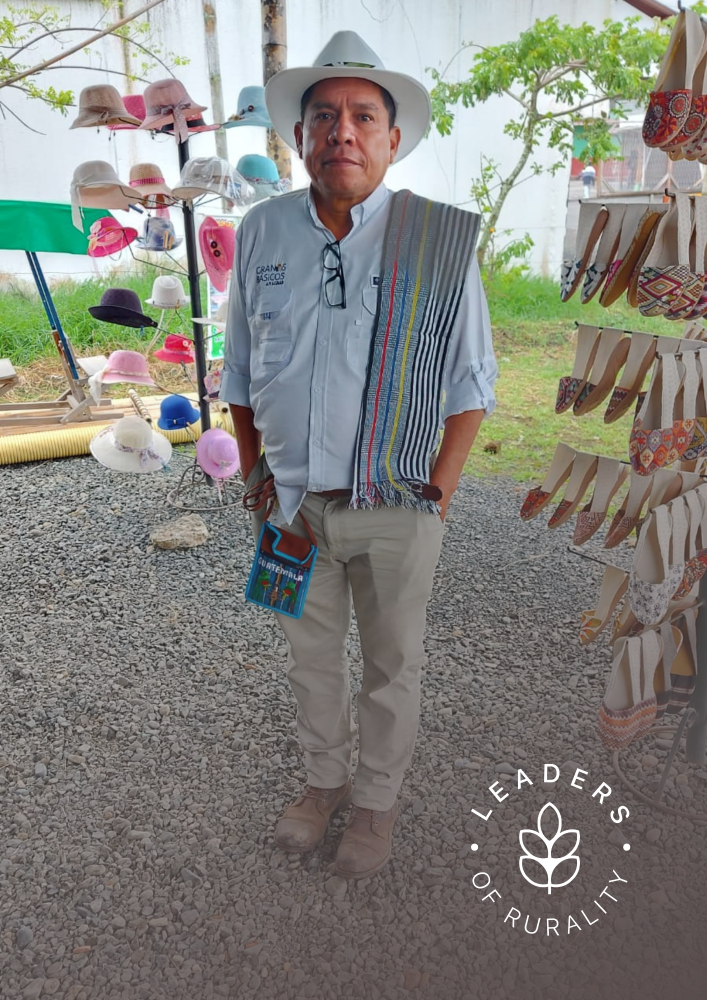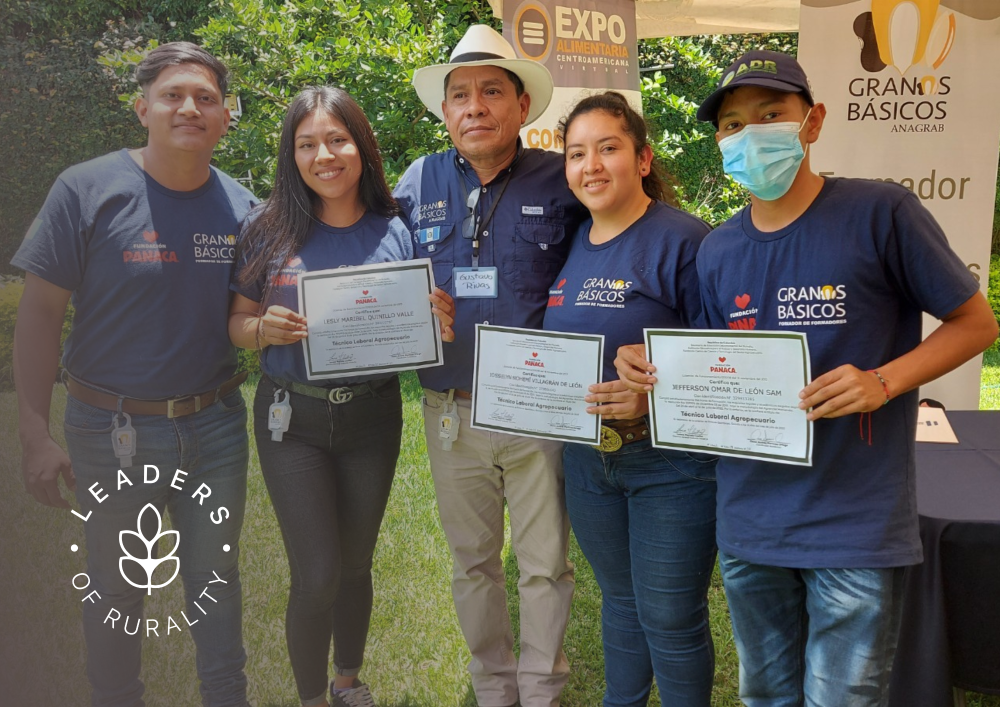He was co-founder of the National Basic Grains Association (ANAGRAB), which brings together both small- and large-scale producers of corn, beans, rice and other daily staples for the Guatemalan people.

San Jose, 8 August 2022 (IICA) – Having devoted his entire life to improving agriculture in Guatemala as a farmer, project manager for the State, private business employee and leader of an association that seeks to professionalize the work of producers, Gustavo Rivas was recognized as a “Leader of Rurality” of the Americas by the Inter-American Institute for Cooperation on Agriculture (IICA).
The “Soul of Rurality” award is an initiative by the agency specialized in agricultural and rural development to pay tribute to men and women who are leaving their mark and making a difference in the rural communities of the Americas, a key region for food and nutrition security and the environmental sustainability of the planet.
Rivas was born into a peasant family as one of eleven siblings. Due to both his own personal efforts and those of his parents, he was able to get an education and go to university, where he graduated with a degree in agricultural engineering, all while working the fields alongside his family. He was always mindful that in order to overcome common problems, to improve working conditions and to obtain a price more in line with the sacrifice they make daily, farmers needed to associate.
Thus, he participated in projects to sell fresh foods directly to consumers and, in 2013, cofounded the National Basic Grains Association (ANAGRAB, for its acronym in Spanish), which brings together both small- and large-scale producers of corn, beans, rice and other daily staples for the Guatemalan people. Today, he is president and legal representative of ANAGRAB.
The Leaders of Rurality award recognizes individuals who are playing a critical dual role as guarantors of food and nutrition security and custodians of the planet’s biodiversity, by producing under any condition. The recognition also highlights these individuals’ capacity to serve as role models in the region’s rural areas.
Gustavo Rivas, the man who chose agriculture while yet in the cradle
Born into a farming family as one of eleven children, Gustavo Rivas choses food production every day.
He was only a few days old when his parents, who had worked in different parts of the country, settled in the municipality of San Andrés Villa Seca, along the southern coast of Guatemala. There, in an area known for its corn production, his parents received 20 hectares of land through a government program with the National Institute for Agricultural Transformation (INTA) aimed at promoting the settlement of peasant families in rural areas.
That family plot, located in an area called Parcelamiento La Máquina, is where Gustavo learned the secrets of farming when he was a young boy and where he still farms today. He has come a long way since then, during which time he studied, sought training, and overcame poverty, all while maintaining an unwavering commitment to recognizing the efforts of small-scale farmers who work tirelessly to put food on the tables of Guatemalans.
Today Gustavo is president and legal representative of the National Basic Grains Association of Guatemala, which brings together small-, medium- and large-scale farmers in the understanding that beyond the size of one’s land and the scale of production, all farmers face similar problems. “We work to dignify the work of grain farmers”, he says.
A life lived in love of the earth
“My father was a farmer his entire life. He worked for many years at the United Fruit Company—the multinational banana and fruit producer—first in northern Guatemala and then along the southern coast. My mother was a homemaker and raised the children. When United Fruit closed operations in Guatemala, they looked for a place to settle and managed to get some land in Parcelamiento La Máquina, where I arrived when I was just eleven days old”, tells Gustavo.
“My siblings and I grew up around production. We planted corn, beans, peppers and cassava and also raised cattle. Living out in the country, from very young, we were involved in all production processes and learned to farm”.

Family farmers ensure food security for the Guatemalan people, where corn, beans and—to a lesser degree—rice, are daily staples. They use corn flour to make tortillas, which workers and farmers eat every day.
“One of my parents’ goals, who were illiterate, was for their eleven children to get an education, because they believed education was important to better one’s life. When I finished primary school, since there were no high schools close to Parcelamiento, I had to go to the city of Quetzaltenango, where I live today. I went to school from Monday to Friday and then returned to Parcelamiento on the weekends”, recalls Gustavo.
After graduating as an expert accountant, he continued his studies while still working on the farm. At the University of San Carlos de Guatemala, the oldest in the country with campuses in every department across the territory, he received a degree in agricultural engineering. He immediately set out to work for the Ministry of Agriculture on a project to plant cold-hardy vegetables for local markets in the area of San Marcos.
“We knew we had to do something different because people wouldn’t escape poverty by doing the same old thing. Normally, programs handed out seeds, pesticides or fertilizer to farmers and while it helped them, it was not sustainable over time, because while it helped them to survive, it did not generate development. So, we began cooperative trade, encouraging farmers to increase the qualities they planted and installing mini farmers markets.
We arranged transport with the Ministry to take the harvest to the City of Guatemala and sell it in the different neighborhoods. The project was a success because we were able to offer consumers better prices, while improving farmer income”.
Gustavo has extensive experience both in the field and behind a desk working in the public and private sectors. Without ever stopping to farm the land belonging to his parents, he was representative to the National Council for Agricultural Development (CONADEA), which was born out of the peace agreements that ended years of civil war in Guatemala, and also worked in the Directorate General of Agricultural Services (DIGESA).
Later, he was called by companies engaged in production and frozen food sales, where he worked to fight pests through pesticide use and management.
When he left his last job, Gustavo turned to agriculture to contribute to improving the work and quality of life of food producers.
“We began organizing grassroots organizations for farmers. The idea was to form regional associations of grain producers and then later national. Our purpose has been to find alternative viable solutions to all the problems. Only association offers farmers access to financing and markets that pay a fair price for food”, he reflects.
“At IICA workshops with farmers from around the country”, he says, “we demonstrated that the problems facing the productive sector are the same for everyone: lack of resources, climate change and high input prices”.
ANAGRAB has celebrated a number of achievements. With new corn varieties and soil analyses that allowed for the use of more suitable fertilizers, Gustavo was able to improve yields. He has also sent young people to be trained abroad in the practice and theory of agriculture.
In collaboration with IICA, he has facilitated useful trainings on best cooperative trade practices. And through production, transport and marketing cost trainings, he has aided many farmers who were unable to calculate these costs. He has also taught how to mix chemical and organic fertilizers, reducing the use of the former by almost 50% without affecting yield.
“Urban folk often only care about low food prices and do not understand the sacrifice farmers make. That is why we’re working to raise awareness in the urban population. During the pandemic, you could see the importance of family farmers who never stopped producing”, assured Gustavo.
The migration of youth is a critical topic, but Gustavo believes it is not irreversible: “To stop migration, we need real development strategies from government, not subsidized programs or handouts, which do not help farmers overcome their hardships.
Across the organizations, we see young people with an interest in agriculture. And we believe that even those who at first may seem uninterested can get involved through new technologies. Many young people leave for the United States because the production costs of raw materials have been below production costs, especially after the rise in fertilizer prices. Agriculture must keep renewing itself to attract young people. I tell them that there are opportunities out in the fields because in our territories, there is the potential to get ahead if we work collectively. No one can succeed alone”.
More information:
Institutional Communication Division
comunicacion.institucional@iica.int











